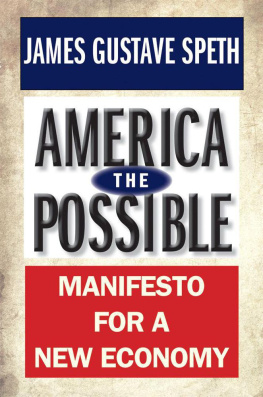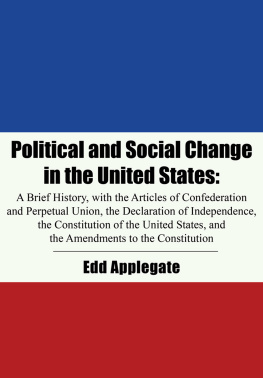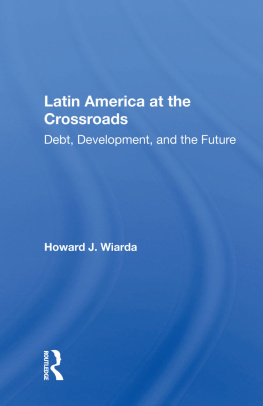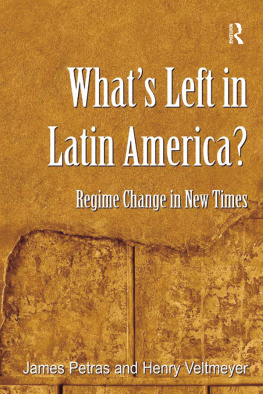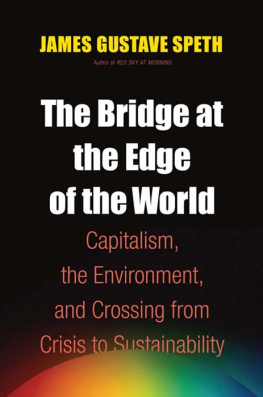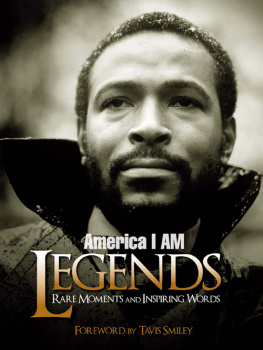America the Possible
James Gustave Speth
America the Possible
Manifesto for a New Economy
Yale UNIVERSITY PRESS
NEW HAVEN AND LONDON
Published with assistance from the foundation established in memory of James Wesley Cooper of the Class of 1865, Yale College.
Copyright 2012 by James Gustave Speth.
All rights reserved.
This book may not be reproduced, in whole or in part, including illustrations, in any form (beyond that copying permitted by Sections 107 and 108 of the U.S. Copyright Law and except by reviewers for the public press), without written permission from the publishers.
Yale University Press books may be purchased in quantity for educational, business, or promotional use. For information, please e-mail (U.K. office).
Look Out by Wendell Berry. Copyright 2005 by Wendell Berry from Given. Reprinted by permission of Counterpoint. Excerpt from The Cure at Troy: A Version of Sophocless Philocretes by Seamus Heaney. Copyright 1990 by Seamus Heaney. Reprinted by permission of Farrar, Straus and Giroux, LLC, and Faber and Faber Limited. Whitman and the Moth by Clive James, The New Yorker, November 22, 2010. Copyright Clive James 2010. Reproduced by permission of United Agents (www.unitedagents.co.uk) on behalf of Dr. Dannie Abse. The Gardener by Linda Pastan. Reprinted by permission of the author.
Set in Fournier type by Newgen North America, Inc. Printed in the United States of America.
Library of Congress Cataloging-in-Publication Data
Speth, James Gustave.
America the possible : manifesto for a new economy / James Gustave Speth.
p. cm.
Includes bibliographical references and index.
ISBN 978-0-300-18076-3 (hardback) 1. United StatesEconomic policy. 2. Environmental policyUnited States. 3. Social justiceUnited States. 4. Progressivism (United States politics). I. Title.
HC106.84. s66 2012
338.973dc23 2012012170
A catalogue record for this book is available from the British Library.
This book was printed with low VOC, vegetable-based inks on FSC-certified acid-, lignin-, and carbon-free recycled paper that contains 30% postconsumer waste. The case materials are FSC-certified: binders boards of 100% postconsumer waste and cover paper that contains postconsumer pulp and is acid-, lignin-, and carbon-free.
This paper meets the requirements of ANSI/NISO Z39.48-1992 (Permanence of Paper).
10 9 8 7 6 5 4 3 2 1
For
Cameron, Rodgers, Lilla, Charlotte, Grace
and all the grandchildren,
and
For all those with whom Ive had the privilege of working over these past four decades. If I could gather you in my arms, it would be a bouquet to save the world.
Good reason to despair, yet grief was purged
By tracing how creation reigned supreme.
A pupa cracked, a butterfly emerged:
America, still unfolding from its dream.
CLIVE JAMES
She starts old, old, wrinkled and writhing in an old skin.
And there is a gradual sloughing off of the old skin,
towards a new youth. It is the myth of America.
D. H. LAWRENCE
Contents
Preface
Like most Americans, I love this country. I love its boundless energy and spirited people, its natural beauty, its creativity in so many fields, its many gifts to the world, and the freedom and opportunity it has given me and others to write books like this onewhich is why on August 20, 2011, I became a jailbird.
Along with sixty-five others, I was arrested in front of the White House protesting the proposed Keystone XL pipeline, all 1,700 miles of it intended to carry oil from the tar sands of Alberta, Canada, to the Gulf Coast to satisfy our countrys insatiable thirst for oil. Our modest act of nonviolent civil disobedience landed us in the central cellblock of the District of Columbia jail for two nights.
Some protesters were acting to stop the desecration of the North American land. My motivation was climate change: after more than thirty years of unsuccessfully advocating for government action to protect our planets climate, I found myself at the end of my proverbial rope. Civil disobedience was my way of saying that Americas economic and political system had failed us all. Having served as President Jimmy Carters White House environmental adviser, helping to found two of our countrys major environmental groups, leading the United Nations largest program for international development, and serving as dean of Yales environment school, I was once dubbed the ultimate insider by Time magazine. But my conclusion in August was and still is that working inside the system is insufficient. We have to step outside Americas broken system of political economy and begin the difficult job of transforming it. As the slogan goes, system change, not climate change.
This book tells the story of how system change can come to America. At its heart is a vision of an attractive, pleasant, and successful America that is still within our power to realize by mid-century. In this America the Possible, our country will have rejoined the leading nations in realizing social justice and well-being, in building peace and real global security, and in sustaining our planets environmental assets both domestically and globally. We will have reclaimed our democracy from what were once quite properly called the moneyed interests. And we will have seen a deep transformation in our countrys dominant values and culture.
Now that is all very nice, you might be thinking, but how do we get there? I will endeavor in this book to chart a course to an America the Possiblea course from todays decline to tomorrows rebirth.
The journey to America the Possible begins when enough Americans have come to some important conclusions. The first is that something is profoundly wrong with our overall political economythe operating system on which our country now runs. That system is now routinely generating terrible results, and is failing us socially, economically, environmentally, and politically. The second conclusion follows from the first. It is the imperative of system change, of building a new political economy that routinely delivers good results for people and planet.
The third conclusion is that, contrary to what one frequently hears, a better alternative does indeed exist. We certainly do not yet understand all the details of how this alternative will look, and much hard analysis and creative experimentation lie ahead. But we do know enough to have confidence that something much better can be built, and we know enough to start building it.
These conclusions are not todays conventional wisdom, but more and more people are embracing them. They are the foundation from which the work of system change can move forward. From the vantage point they provide, we can see how the dynamics of fundamental change might emerge. As conditions in our country continue to decline across a wide front, or at best fester as they are, ever-larger numbers of Americans lose faith in the current system and its ability to deliver on the values it proclaims. The system steadily loses support, leading to a crisis of legitimacy. Meanwhile, traditional crises, both in the economy and in the environment, grow more numerous and fearsome. In response, progressives of all stripes coalesce, find their voice and their strength, and pioneer the development of a powerful set of new ideas and policy proposals confirming that the path to a better world does indeed exist. Demonstrations and protests multiply, and a popular movement for prodemocracy reform and transformative change is born. At the local level, people and groups plant the seeds of change through a host of innovative initiatives that provide inspirational models of how things might work in a new political economy devoted to sustaining human and natural communities. Sensing the direction in which things are moving, our wiser and more responsible leaders, political and otherwise, rise to the occasion, support the growing movement for change, and frame a compelling story or narrative that makes sense of it all and provides a positive vision of a better America. The movement broadens to become a major national force.
Next page
